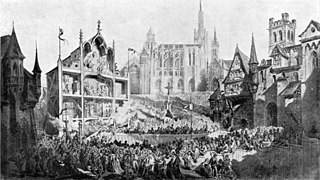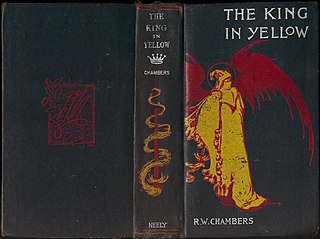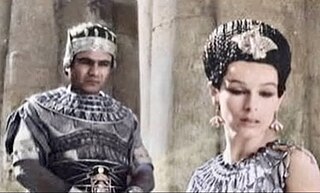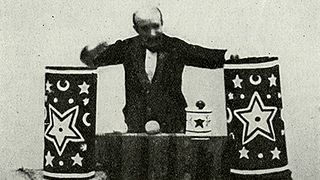Notes
- ↑ p24 "The Chambers Dictionary"Edinburgh, Chambers, 2003 ISBN 0-550-10013-X
An afterpiece is a short, usually humorous one-act playlet or musical work following the main attraction, the full-length play, and concluding the theatrical evening. [1] This short comedy, farce, opera or pantomime was a popular theatrical form in the 18th and 19th centuries. It was presented to lighten the five-act tragedy that was commonly performed.
A similar piece preceding the main attraction is a curtain raiser.
An example is The Padlock by Charles Dibdin, first performed in London in 1768.

Mystery plays and miracle plays are among the earliest formally developed plays in medieval Europe. Medieval mystery plays focused on the representation of Bible stories in churches as tableaux with accompanying antiphonal song. They told of subjects such as the Creation, Adam and Eve, the murder of Abel, and the Last Judgment. Often they were performed together in cycles which could last for days. The name derives from mystery used in its sense of miracle, but an occasionally quoted derivation is from ministerium, meaning craft, and so the 'mysteries' or plays performed by the craft guilds.

The English Renaissance theatre or Elizabethan theatre was the theatre of England from 1558 to 1642. Its most prominent playwrights were William Shakespeare, Christopher Marlowe and Ben Jonson.

The King in Yellow is a book of short stories by American writer Robert W. Chambers, first published by F. Tennyson Neely in 1895. The British first edition was published by Chatto & Windus in 1895.
The Master of the Revels was the holder of a position within the English, and later the British, royal household, heading the "Revels Office" or "Office of the Revels". The Master of the Revels was an executive officer under the Lord Chamberlain. Originally he was responsible for overseeing royal festivities, known as revels, and he later also became responsible for stage censorship, until this function was transferred to the Lord Chamberlain in 1624. However, Henry Herbert, the deputy Master of the Revels and later the Master, continued to perform the function on behalf of the Lord Chamberlain until the English Civil War in 1642, when stage plays were prohibited. The office continued almost until the end of the 18th century, although with rather reduced status.

Mickey's Revue is a 1932 Walt Disney cartoon, directed by Wilfred Jackson, which features Mickey Mouse, Minnie Mouse, Horace Horsecollar and Clarabelle Cow performing a song and dance show. The film was delivered to Columbia Pictures on May 12 and released on May 27, 1932. It was the 41st Mickey Mouse film, and the fifth of that year.
Entr'acte means 'between the acts'. It can mean a pause between two parts of a stage production, synonymous to an intermission, but it more often indicates a piece of music performed between acts of a theatrical production.

A short film is a film with a low running time. The Academy of Motion Picture Arts and Sciences (AMPAS) defines a short film as "an original motion picture that has a running time of not more than 40 minutes including all credits". Other film organizations may use different definitions, however; the Academy of Canadian Cinema and Television, for example, currently defines a short film as 45 minutes or less in the case of documentaries, and 59 minutes or less in the case of scripted narrative films.

Laws of Attraction is a 2004 romantic comedy film directed by Peter Howitt, based on a story by Aline Brosh McKenna and screenplay by Robert Harling and McKenna. It stars Pierce Brosnan and Julianne Moore.
Starting in 1896, the Theatrical Syndicate was an organization in the United States that controlled the majority of bookings in the country's leading theatrical attractions. The six-man group was in charge of theatres and bookings. The Syndicate's power would peak in 1907.

Wallace Vincent Boag was an American performer known for his starring role in Disney's long-running stage show the Golden Horseshoe Revue and as the voice of Jose the parrot in Walt Disney's Enchanted Tiki Room.

Benjamin Charles Stephenson or B. C. Stephenson was an English dramatist, lyricist and librettist. After beginning a career in the civil service, he started to write for the theatre, using the pen name "Bolton Rowe". He was author or co-author of several long-running shows of the Victorian theatre. His biggest hit was the comic opera Dorothy, which set records for the length of its original run.
The Children of Paul's was the name of a troupe of boy actors in Elizabethan and Jacobean London. Along with the Children of the Chapel, they were an important component of the companies of boy players that constituted a distinctive feature of English Renaissance theatre.

Hand fetishism, hand partialism or cheirophilia is the sexual fetish for hands. This may include the sexual attraction to a specific area such as the fingers, palm, back of the hand and/or nails, or the attraction to a specific action performed by the hands; which may otherwise be considered non-sexual—such as washing and drying dishes, painting of the fingernails and nail-biting. This fetish may manifest itself as a desire to experience physical interaction or as a source of sexual fantasy.

The Theatres Act 1843 is a defunct Act of Parliament in the United Kingdom. It amended the regime established under the Licensing Act 1737 for the licensing of the theatre in Great Britain, implementing the proposals made by a select committee of the House of Commons in 1832.
Linda Chambers is an American playwright, screenwriter, actress and college instructor living and working in Baltimore, Maryland.

A curtain raiser is a performance or performer that opens a show or event for the main attraction; it is usually shorter than the main attraction, but not always. The term is derived from the act of raising the stage curtain.

A play is a form of drama that primarily consists of dialogue between characters and is intended for theatrical performance rather than mere reading. The creator of a play is known as a playwright.

Jack Carroll is an English comedian and actor. He competed in the seventh series of Britain's Got Talent at the age of 14, finishing as the runner-up. As an actor, he appeared in two series of the CBBC series Ministry of Curious Stuff and from 2014 to 2018, he starred in the Sky sitcom Trollied. Carroll, whose cerebral palsy is often a subject of his act, won a Pride of Britain award in 2012. He returned to mainstream media in 2024, taking on a regular role in Coronation Street.

Conjuring is a 1896 French silent trick film directed by Georges Méliès, who is also the actor doing the "conjuring".